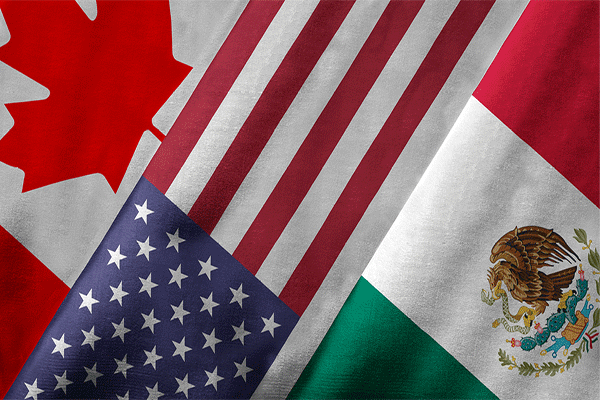 The California Chamber of Commerce submitted public comments on November 3, as the Office of the U.S. Trade Representative is starting a public consultation process in advance of the Joint Review of the Agreement between the United States of America, the United Mexican States, and Canada (USMCA) on July 1, 2026.
The California Chamber of Commerce submitted public comments on November 3, as the Office of the U.S. Trade Representative is starting a public consultation process in advance of the Joint Review of the Agreement between the United States of America, the United Mexican States, and Canada (USMCA) on July 1, 2026.
Since the early 1990’s, the CalChamber has supported the concept and establishment of a North American Free Trade Agreement (NAFTA) based upon an assessment that it serves the employment, trading and environmental interests of California and the United States, as well as Canada and Mexico, and is beneficial to the business community and society as a whole.
That support continued during the first President Trump administration when the United States, Mexico and Canada reached an agreement to modernize the 25-year-old NAFTA into a 21st century, high-standard agreement.
The CalChamber continues to believe the U.S.-Mexico-Canada Agreement supports mutually beneficial trade leading to freer markets, fairer trade, and robust economic growth in North America.
Now as all three countries have begun to organize for the six-year USMCA review in July 2026, the CalChamber continues to support the objectives of the USMCA to eliminate barriers to trade, promote conditions of fair competition, increase investment opportunities, provide adequate protection of intellectual property rights, establish effective procedures for implementing and applying the agreements and resolving disputes, and to further trilateral, regional and multilateral cooperation.
The process, which begins in year six of the pact (2026), allows each country to either confirm its desire to extend the agreement or raise concerns that it wants to address. In the latter scenario, the three countries will continue the review every year until either the concerns are resolved, or the pact is terminated in year 16. Therefore, with California’s position as a global leader in international trade, the priorities of the USMCA are important to CalChamber members and the overall economic health of our state.
USMCA Statistics
The United States, Canada and Mexico comprise more than 520 million people (6.3% of the world’s population), more than $33 trillion in gross domestic product (GDP) (nearly 30% of world GDP), and $1.8 trillion in goods and services trade (5.5% of $33 trillion in total global trade). More than 13 million American jobs depend on trade with Mexico and Canada. The USMCA provides duty-free access for nearly all goods traded among the three countries.
The importance of total U.S.-USMCA goods trade at $1.601 trillion cannot be overstated. The $683.94 billion in exports to Mexico and Canada include transportation equipment ($116.69 billion), computer and electronic products ($80.47 billion), chemicals ($69.03 billion), non-electrical machinery ($63.99 billion), and petroleum and coal products ($49.06 billion).
Total U.S. imports from Mexico and Canada of $917.41 billion include transportation equipment ($238.95 billion), oil and gas ($117.91 billion), computer and electronic products ($104.75 billion), electrical equipment, appliances and components ($54.13 billion), and non-electrical machinery ($52.51 billion).
CalChamber Position
The original key provisions of the USMCA, including focus on rules of origin, goods market access, intellectual property modernization, ease of customs and trade rules for small business, greater market access for American agriculture, strong disciplines on digital trade, and enforceable labor standards, are as important to the agreement today as they were when first implemented. Through all these provisions should run the continued theme of compliance and enforcement.
The CalChamber urges the Trump administration to continue to engage with Mexico and Canada and swiftly extend the USMCA. In fact, it is hoped that the continued success of the USMCA may serve as a foundation for future trade agreements around the world.
The USMCA creates a stable and certain commercial environment that reinforces strong economic ties and enhances North American competitiveness in the global market, thereby ensuring North American economic security, which leads to geopolitical security.
Staff Contact: Susanne T. Stirling

